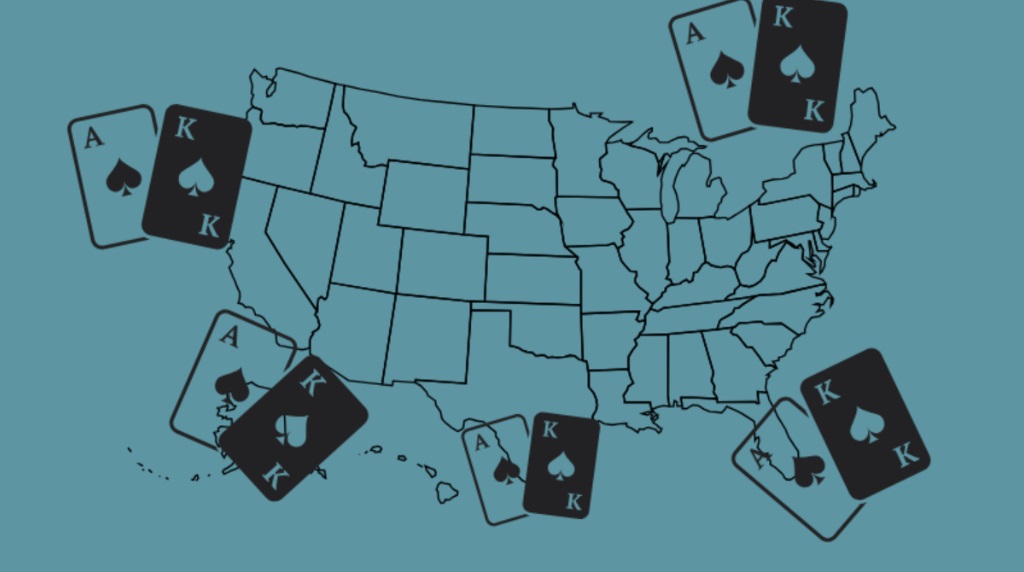Only 30 Cents of Every Dollar in US Online Gaming Revenue is Legal
Even though nearly 80% of states have legal gaming, more than 70% of revenue in the industry is generated by unregulated platforms.

Offshore and unregulated operators account for 70% of US gaming revenue.
Key Facts:
- Three-quarters of revenue from online gaming is generated by unregulated operators
- States without legal online casinos have the most unregulated offshore revenue generation
- More regulation is not necessarily a remedy for illegal operators
- Sweepstakes casinos have carved out a niche with consumers in the US
Despite rapid growth in legalized online gambling across the United States, a new report reveals that illegal operators still control the majority of the market.
According to a supplement to the USA National Online Gambling Report 2024, commissioned by the Campaign for Fairer Gambling (CFG), only 26% of gross gambling revenue (GGR) in the United States is generated by licensed platforms.
The remaining 74%—a staggering $67.1 billion—is funnelled through offshore and unregulated channels.
The research for this eye-opening conclusion was conducted by online market intelligence firm Yield Sec, which monitored digital gambling activity in all 50 states.
Unlike traditional research methods that rely on self-reported figures, Yield Sec uses keyword tracking, Artificial Intelligence (AI) analysis, and a proprietary threat matrix to distinguish between legal and illicit platforms, evaluate risk, and assess regulatory impact.
This research comes while two of the largest economies in the US without legal online gaming: California and Texas have yet to join the party of regulated iGaming and sports betting apps.
Legal Gambling Lags Behind in Market Penetration
The data suggests that while legalized gambling is expanding, it is far from displacing unregulated alternatives. In fact, the presence of legal options may be inadvertently increasing consumer spending overall.
States with online sportsbooks and casinos see a 261% higher per capita GGR than states without legal digital gambling options. This information indicates that states without legalized gaming account for much of the unregulated activity. In other words, people find ways to bet on sports or play slots on their mobile phones, even if they live in illegal areas.
According to CFG, illegal gambling websites maintain a competitive edge due to broader product offerings, more aggressive promotions, and fewer regulatory restrictions. For many Americans, illegal platforms have been the default for years, the report states.
These brands offer convenience, variety, and attractive prices—often without players realizing they’re using unlicensed services.
The legal gambling industry is consistently undercut by criminal operators who don’t pay taxes, licensing fees, or comply with regulations. They flood the market with bonuses and have low barriers to entry. — Ismail Vali, Yield Sec, Founder and CEO
Report: There Remains an Offshore Dominance in Gaming
The total GGR for 2024 is estimated at $90.1 billion, with legal entities responsible for just $23 billion. While licensed platforms posted a respectable 26% year-over-year growth, illegal operations grew even faster, up 64% from 2023.
Part of the imbalance is tied to sheer volume: the US hosts just 95 legal gambling platforms and 106 affiliated marketing partners. In contrast, there are 917 illegal gambling sites operating in the country, supported by 668 affiliate promoters. This creates a digital ecosystem that overwhelms the visibility of legal offerings.
Legal online gambling captured only 12% of total user exposure in 2024, according to the report. While some US lawmakers target advertising restrictions for licensed platforms, illegal sites have no such constraints and often ramp up their presence around marquee sporting events like the Super Bowl and March Madness.
Adding to the confusion, some major media outlets reportedly feature offshore brands as if they were regulated. This is a concern that further blurs the line for consumers.
Sweepstakes Casinos Muddy the Waters
Sweepstakes casinos, another gray area in online gaming, have also gained traction. States like Montana and Connecticut have moved to ban them, and New York is pushing for tighter oversight. Still, the proliferation of alternative gambling platforms continues to erode market share for legal operators.
In states where online casinos are legal, regulated operators claim a stronger foothold:
- Pennsylvania: Legal platforms earned $3.58 billion, 57% of total GGR
- New Jersey: Legal market generated $3.55 billion, or 58%
- Michigan: Legal operators took in $2.91 billion, 57% of the state’s GGR
By contrast, in high-population states without legalized online casinos, offshore gambling dominates:
- California: $5.49 billion in GGR, all from illegal operators
- New York: $5.3 billion total GGR, 72% illegal
- Ohio: $5.26 billion, with 85% attributed to offshore platforms
- Texas: Entire $4.5 billion market is illegal
- Illinois: 76% of the $3.54 billion GGR comes from illicit operators
Ohio, in particular, stands out with a GGR per capita of $316 from illegal online casinos. This is the highest in the country.
Consumers in the Buckeye State are finding ways to play slots and casino table games even while lawmakers have failed to make that activity legal.
Legalization Doesn’t Provide Complete Protection
The Campaign for Fairer Gambling cautions that legalization is not a cure-all. In Ohio, one year after legalizing sports betting in 2023, online gambling losses have already reached 1.33% of the average per capita income, more than double the national average.
CFG founder Derek Webb called Ohio “the alarm bell America needs to hear”, pointing out that total gambling losses grow in states where online betting is legal.
Income Share and Gambling Impact
CFG’s supplemental data shows how gambling spending grows in relation to income as states expand legal online options:
- National average GGR per capita: 0.62% of income
- States with no online gambling (e.g., California): 0.31%
- States with legal online sports betting only (e.g., New York): 0.77%
- States with full online gambling (e.g., New Jersey): 1.12%
The jump from no online gambling to legalized sports betting results in a 148% increase in gambling spend per income. Adding online casinos spikes that number to 261%, according to the analysis from Yield Sec.
The report adds urgency to the ongoing policy debates in several states, particularly Ohio, where lawmakers are considering legislation to legalize iGaming while proposing a crackdown on sweepstakes casinos.
Strong opposition to illegal gaming remains from retail casino interests, and broader questions persist about how to balance revenue generation with responsible gambling oversight.
In some jurisdictions, tribal nations that have gaming rights granted to them under treaties and federal authorization, are adamantly opposed to commercial operators, unregulated or not.
As the US gambling landscape continues to evolve, the challenge remains clear: legal operators must find ways to compete with offshore alternatives and prove that regulated markets can protect consumers without escalating overall harm.

 Book of Dead GO Collect by Play’n GO: New Slot Preview
Book of Dead GO Collect by Play’n GO: New Slot Preview
 Hot Ross by Hacksaw Gaming: New Slot Release Preview
Hot Ross by Hacksaw Gaming: New Slot Release Preview
 $1.6B Super Bowl Trading Sparks Prediction Market Debate
$1.6B Super Bowl Trading Sparks Prediction Market Debate